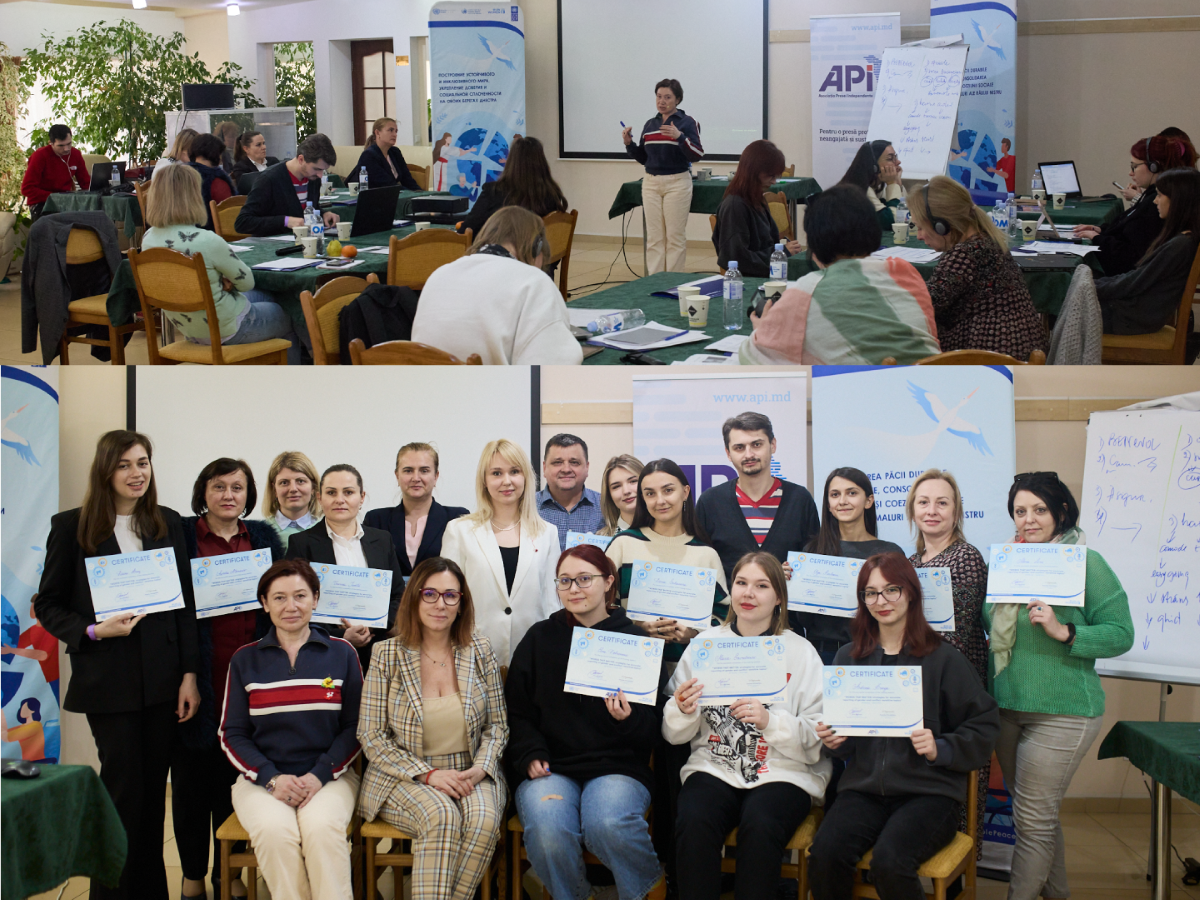back
Media Professionals Strengthen Their Skills to Report Accurately on Gender and Conflict-Sensitive Issues

Fifty journalists, PR and public communication specialists, photographers and civil society activists from different parts of the country, including the left bank of Nistru River, strengthened their professional capacities in reporting on gender and conflict-sensitive issues during a cycle of three trainings conducted by UN Women and API. The final training took place from 29 February to 1 March 2024, at one of the resorts in Vadul lui Vodă.
On the first day, trainers Ludmila Andronic and Loretta Handrabura spoke to participants about ethical issues in reporting on different types of conflicts, rights, opportunities and shared responsibilities of women and men, risks and consequences of misreporting gender relations and perpetuating stereotypes in the media. An important theme was to ensure gender balance in media and public communication products, the use of female forms for male terms, the identification and realization of issues that would enhance the role of women in society, with a focus on positive issues and practices for the advancement of women. "The media is dominated by journalistic material about women and girls who are victims of violence, their problems are reported, but too little attention is paid to solutions, to how women overcome difficulties and can serve as role models for other women. To do this, journalists need to seek out and produce material that highlights women and their concerns. Here we can talk about material about women who have achieved professional success, especially in areas where men dominate, such as politics, business, sports," Ludmila Andronic says.
The essential role of women in ensuring social balance in conflict prevention and post-conflict situations, how the media should report accurately from conflict zones – these and other related topics were discussed on the second day of the training. The topic of forms of sexism perpetuated in the media, including the harmful effects of sexist advertising and ways to counteract it, was of particular interest. Trainer Loretta Handrabura presented a series of examples of sexist language, especially promoted by politicians during talk shows, interviews, press conferences from 2021 to 2023. She mentioned that "sexist advertising is regulated by the Advertising Law, which came into force in 2023, which defines the bodies responsible for its application, as well as the sanctions for those who promote it and discredit women. Unfortunately, however, the sanctioning mechanisms do not work as they should. When the media, especially online, is full of sexist advertisements and language, the role of media professionals, activists and others is to report cases, alert the responsible authorities, and engage in reasoned discussions to discourage such harmful practices."
As in the previous two trainings, the agenda included practical exercises, and participants were actively involved in identifying examples of gender stereotypes promoted in the media, analyzing several cases of correct and incorrect use of stereotypical images and language, stories about refugee women, and others.
At the end of the two days, the beneficiaries of the program received certificates of attendance and mastery of the material presented during the training. The handover took place in an unusual way proposed by the organizers. Each person drew a certificate at random and handed it to their colleague, while sharing their impressions of the training session.
Most of the speakers appreciated the usefulness, but also the good organization of the training. "This training gave me courage, I understood that strong women are raised by financially independent mothers and are taught qualities that allow them to develop and defend their rights from a young age. In the radio shows that I will produce, I will invite more often women who have asserted themselves professionally, who have overcome problems to have their voices heard, to show through concrete examples that there are solutions to different difficult situations and that women can overcome them and deserve a better life," said Ina Guțu from Radio Chișinău.
"In the future, I will be more careful to ensure that journalistic material is balanced in its use of experts and pundits as sources and protagonists. I will ensure that this is respected by my colleagues. I will use the feminine form correctly where it is needed and avoid stereotypes not only in my professional work but also in my everyday life," said Maria Loris from the Esp.md portal in Bălți.
"I was surprised by the information that there is such a huge lack of balance in media coverage of gender equality and that there are so few stories about women. Equally worrying is the large amount of material in which sexist messages are used to discredit women, including sexist advertising. It was important for me to understand how we can counteract such phenomena and how to properly communicate such things to the young people I work with in my daily work. I thank the trainers and organizers for this wonderful opportunity to learn new and useful things," added Maria Gavrilcenco from the youth organization Najda4ka.md in Tiraspol.
The organizers reminded those present of the opportunity to participate in the open competition with prizes "Contribution of Media Professionals to Strengthening Peace and Social Cohesion," launched last year by API and UN Women. The competition will run from 1 November 2023 to 10 June 2024. For the purpose, eligibility and other details, please click HERE.
This activity is part of the program "Media for Peace and Equality on Both Banks of Nistru River," implemented by the Association of Independent Press (API) within the framework of the project "Building Sustainable and Inclusive Peace, Strengthening Trust and Social Cohesion on Both Banks of Nistru/Dniester River," jointly implemented by the UN Human Rights Office (OHCHR), UN Women and UNDP, funded by the United Nations Peacebuilding Fund (UN PBF).